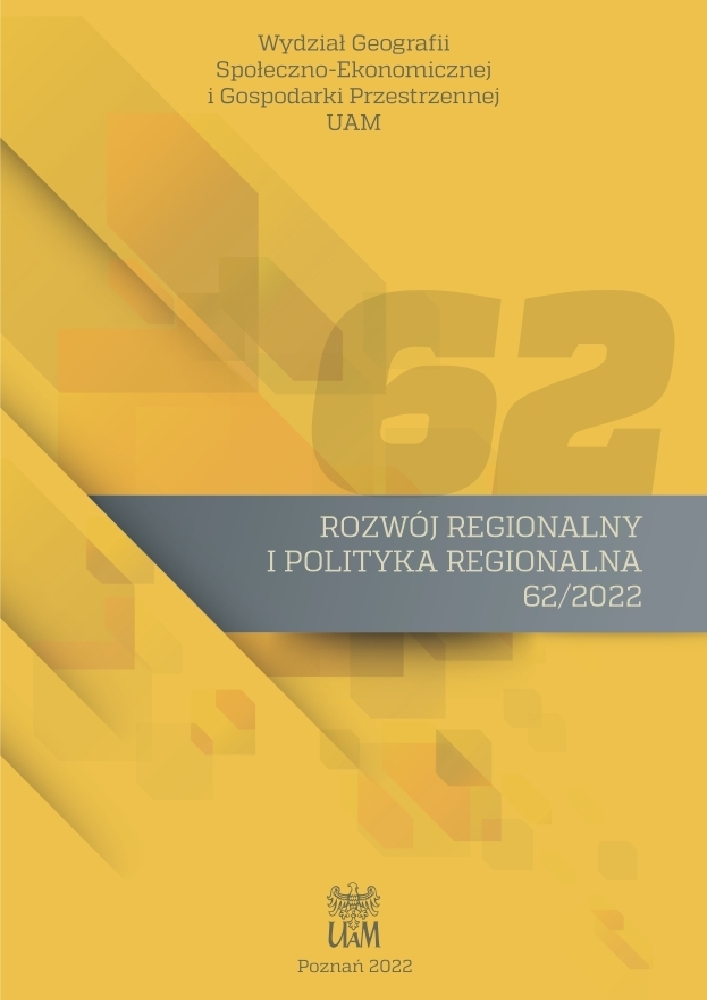Abstract
Monitoring is an integral part of the management of revitalisation programmes. The importance of monitoring is emphasised both in the literature and in strategic documents at the central and regional level. Also, the provisions of revitalisation programmes emphasise the key role of monitoring for effective management of the programme implementation process. Numerous studies and reports, however, indicate that municipalities shy away from carrying it out. Documents developed at the central level do contain guidelines on conducting monitoring and evaluation, but they are of a rather general nature. In some voivodships regional guidelines were established for carrying out revitalisation under the Regional Operational Programmes, which also refer to the monitoring system. The most detailed rules were adopted in the Wielkopolskie Voivodeship (Ciesiółka 2019, p. 27). The guidelines oblige local governments to monitor the effects of revitalisation programmes. The aim of this paper is to reflect on the obligation to monitor revitalisation programmes, as well as on the scope of data collected for this purpose and the possibility of their use at the regional level. The paper uses a desk-based data analysis, a case study method and an e-mail interview.
The article begins with an introduction. Part two presents the current legal and strategic regulations for monitoring revitalisation at the local level. The third part describes methods used in this article. Part four reviews the regional principles for revitalisation programming. The fifth part presents an in-depth characterisation of the monitoring system adopted in the Wielkopolskie voivodship. Part six includes recommendations in relation to the analysed system. The article concludes with a summary.
References
Bundesministerium für Verkehr, Bau- und Stadtentwicklung. 2011. Evaluierung der Städtebauförderung - Kommunale Arbeitshilfe, Berlin.
Bundesministerium für Verkehr, Bau- und Stadtentwicklung. 2012. Evaluierung der Städtebauförderung. Leitfaden für Programmverantwortliche, Berlin.
Chen H.T. 2005. Practical Program Evaluation: Assessing and improving planning, implementation, and effectiveness. Thousand Oak, London, New Delhi.
Ciesiółka P. 2019. Systemy monitorowania rewitalizacji w gminach województwa wielkopolskiego. Rozwój Regionalny i Polityka Regionalna, 48: 23-39. https://doi.org/10.14746/rrpr.2019.48.03 DOI: https://doi.org/10.14746/rrpr.2019.48.03
Czochański J.T. 2013. Monitoring rozwoju regionalnego. Aspekty metodologiczne i implementacyjne. Studia KPZK PAN, 149.
Dahlin E. 2021. Email Interviews: A Guide to Research Design and Implementation. International Journal of Qualitative Methods, 20: 1-10. https://doi.org/10.1177/16094069211025453 DOI: https://doi.org/10.1177/16094069211025453
Górniak J., Keller K. 2007. Wskaźniki w ewaluacji ex-post programów publicznych. [W:] A. Haber (red.), Ewaluacja ex-post. Teoria i praktyka badawcza. PARP, Warszawa.
GUS 2019. Zeszyt metodologiczny. Rewitalizacja w gminie. Urząd Statystyczny we Wrocławiu, Wrocław.
Göddecke-Stellmann J. 2016. Jede Maßnahme ist anders - Nutzen und Grenzen quantitativer Daten für das Monitoring der Städtebauförderung. Informationen zur Raumentewicklung, 1: 7-28.
(IfS 2009) Institut für Stadtforschung und Strukturpolitik GmbH. 2009. Entwicklung von Performanzindikatoren als Grundlage für die Evaluierung von Förderprogrammen in den finanzpolitisch relevanten Politikfeldern, Berlin.
Jadach-Sepioło A. (red.) 2018. Gminny Program Rewitalizacji. Praktyczny poradnik dla mieszkańców i władz lokalnych. Warszawa.
Jadach-Sepioło A. (red.) 2021. Ewaluacja systemu zarządzania i wdrażania procesów rewitalizacji w Polsce. Instytut Rozwoju Miast i Regionów, Warszawa.
Jadach-Sepioło A., Spadło K., Kułaczkowska A. (red.) 2020. Monitorowanie procesów rozwoju na poziomie wewnątrzmiejskim. Poradnik. MFiPR/IRMiR, Warszawa.
James N. 2016. Using email interviews in qualitative educational research: Creating space to think and time to talk. International Journal of Qualitative Studies in Education, 29(2): 150-163. https://doi.org/10.1080/09518398.2015.1017848 DOI: https://doi.org/10.1080/09518398.2015.1017848
(KE 2011) Komisja Europejska. 2011. Outcome Indicators and Targets. Towards a New System of Monitoring and Evaluation in EU Cohesion Policy. Rzym. (https://ec.europa.eu/regional_policy/sources/docgener/evaluation/doc/performance/outcome_indicators_en.pdf; dostęp: 11.07.2021).
Leszczyński M., Kadłubowski J. 2016. Ustawa o rewitalizacji - praktyczny komentarz. Ministerstwo Infrastruktury i Budownictwa, Departament Polityki Przestrzennej, Warszawa.
Makowska M. 2013. Analiza danych zastanych. Podręcznik dla studentów. Wydawnictwo Naukowe Scholar, Warszawa.
Meho L.I. 2006. E-mail interviewing in qualitative research: A methodological discussion. Journal of the American Society for Information Science and Technology, 57(10): 1084-1095. https://doi.org/10.1002/asi.20416 DOI: https://doi.org/10.1002/asi.20416
Ministerstwo Rozwoju. 2015. Wytyczne Ministerstwa Rozwoju w zakresie rewitalizacji w programach operacyjnych na lata 2014-2020. Warszawa.
Najwyższa Izba Kontroli (NIK). 2021. Realizacja programów rewitalizacji i ich efekty. Warszawa.
Narodowy Plan Rewitalizacji. Założenia, przyjęte przez polski rząd dnia 15.06.2014.
Nullmeier F. 2001. Kennzahlen und Performance Measurement. [W:] B. Blanke (red.), Handbuch zur Verwaltungsreform. Leske + Budrich, Opladen, s. 383-391. https://doi.org/10.1007/978-3-322-93216-7_43 DOI: https://doi.org/10.1007/978-3-322-93216-7_43
OECD/DAC. 2009. Evaluation and aid effectiveness. Glossary of Key Terms in Evaluation and Results Based Management.
Patton M.Q. 2002. Qualitative Research and Evaluation Methods. Thousand Oaks, London, New Delhi.
Petocz P., Gordon S., Reid A. 2012. Towards a Method for Research Interviews using E-Mail. [W:] C.N. Silva (red.), Online Research Methods in Urban and Planning Studies: Design and Outcomes. IGI Global, s. 70-85. https://doi.org/10.4018/978-1-4666-0074-4.ch005 DOI: https://doi.org/10.4018/978-1-4666-0074-4.ch005
Rossi H.P., Lipsey M.W., Freedman H.E. 2004. Evaluation: A systematic approach. 7th Ed. Thousand Oaks, London, New Delhi.
Spadło K. 2021. Skuteczność procesów rewitalizacji w Polsce - doświadczenie czy wyzwanie? Urban Development Issues, 71: 9-10. https://doi.org/10.51733/udi.2021.71.01 DOI: https://doi.org/10.51733/udi.2021.71.01
Spadło K., Jadach-Sepioło A. 2020. Analiza programów rewitalizacji funkcjonujących w województwie opolskim w latach 2014-2020. Instytut Rozwoju Miast i Regionów, Warszawa.
Ustawa z dnia 9 października 2015 r. o rewitalizacji (t.j. Dz.U. z 2021 r., poz. 485).
License
Copyright (c) 2022 Natalia Dziarmakowska

This work is licensed under a Creative Commons Attribution 4.0 International License.

